Capstone Project Weekly Journals Research 2022
VerifiedAdded on 2022/10/17
|15
|3920
|44
AI Summary
Contribute Materials
Your contribution can guide someone’s learning journey. Share your
documents today.

Running head: CAPSTONE PROJECT WEEKLY JOURNALS
CAPSTONE PROJECT WEEKLY JOURNALS
Name of the Student:
Name of the University:
Author note:
CAPSTONE PROJECT WEEKLY JOURNALS
Name of the Student:
Name of the University:
Author note:
Secure Best Marks with AI Grader
Need help grading? Try our AI Grader for instant feedback on your assignments.
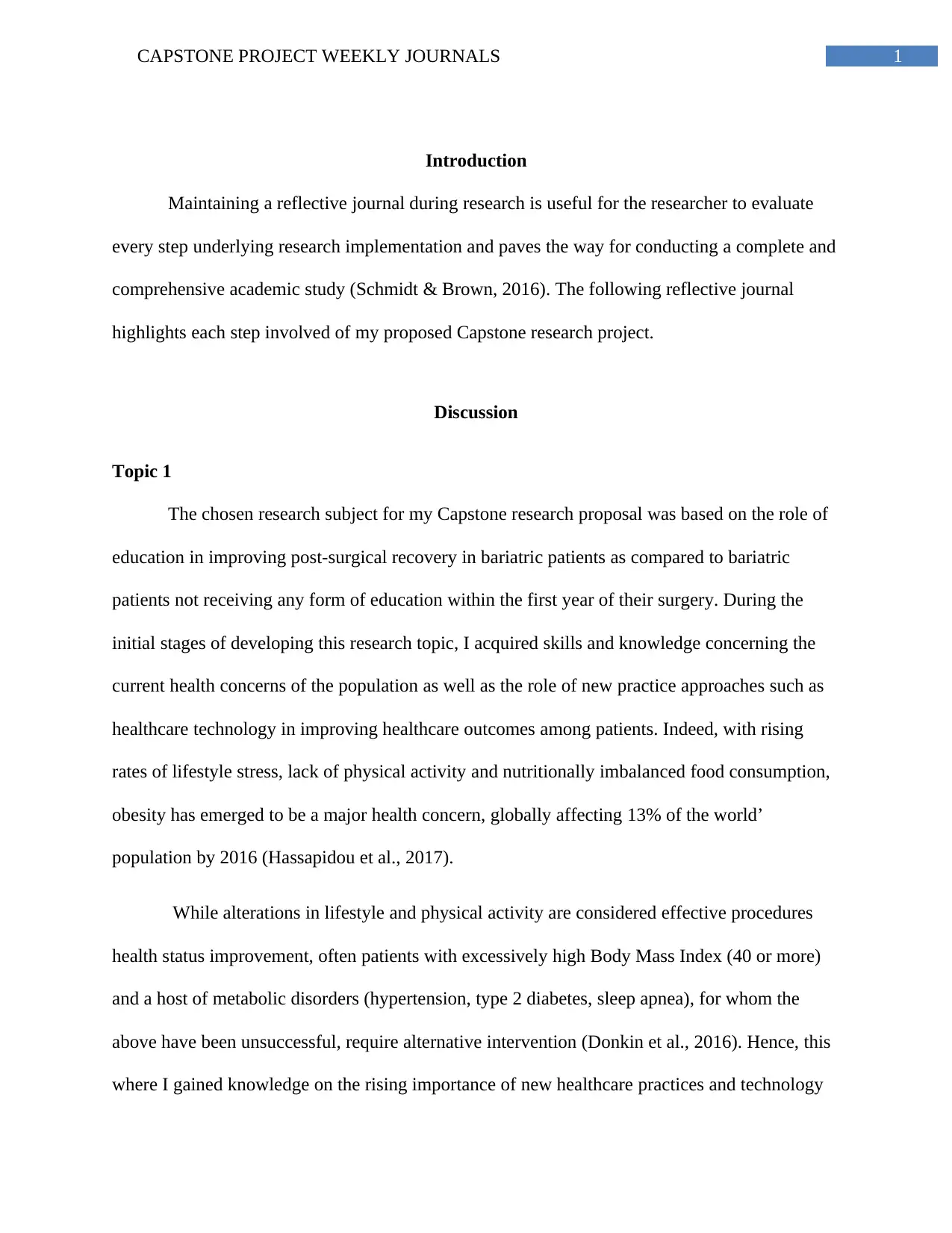
1CAPSTONE PROJECT WEEKLY JOURNALS
Introduction
Maintaining a reflective journal during research is useful for the researcher to evaluate
every step underlying research implementation and paves the way for conducting a complete and
comprehensive academic study (Schmidt & Brown, 2016). The following reflective journal
highlights each step involved of my proposed Capstone research project.
Discussion
Topic 1
The chosen research subject for my Capstone research proposal was based on the role of
education in improving post-surgical recovery in bariatric patients as compared to bariatric
patients not receiving any form of education within the first year of their surgery. During the
initial stages of developing this research topic, I acquired skills and knowledge concerning the
current health concerns of the population as well as the role of new practice approaches such as
healthcare technology in improving healthcare outcomes among patients. Indeed, with rising
rates of lifestyle stress, lack of physical activity and nutritionally imbalanced food consumption,
obesity has emerged to be a major health concern, globally affecting 13% of the world’
population by 2016 (Hassapidou et al., 2017).
While alterations in lifestyle and physical activity are considered effective procedures
health status improvement, often patients with excessively high Body Mass Index (40 or more)
and a host of metabolic disorders (hypertension, type 2 diabetes, sleep apnea), for whom the
above have been unsuccessful, require alternative intervention (Donkin et al., 2016). Hence, this
where I gained knowledge on the rising importance of new healthcare practices and technology
Introduction
Maintaining a reflective journal during research is useful for the researcher to evaluate
every step underlying research implementation and paves the way for conducting a complete and
comprehensive academic study (Schmidt & Brown, 2016). The following reflective journal
highlights each step involved of my proposed Capstone research project.
Discussion
Topic 1
The chosen research subject for my Capstone research proposal was based on the role of
education in improving post-surgical recovery in bariatric patients as compared to bariatric
patients not receiving any form of education within the first year of their surgery. During the
initial stages of developing this research topic, I acquired skills and knowledge concerning the
current health concerns of the population as well as the role of new practice approaches such as
healthcare technology in improving healthcare outcomes among patients. Indeed, with rising
rates of lifestyle stress, lack of physical activity and nutritionally imbalanced food consumption,
obesity has emerged to be a major health concern, globally affecting 13% of the world’
population by 2016 (Hassapidou et al., 2017).
While alterations in lifestyle and physical activity are considered effective procedures
health status improvement, often patients with excessively high Body Mass Index (40 or more)
and a host of metabolic disorders (hypertension, type 2 diabetes, sleep apnea), for whom the
above have been unsuccessful, require alternative intervention (Donkin et al., 2016). Hence, this
where I gained knowledge on the rising importance of new healthcare practices and technology
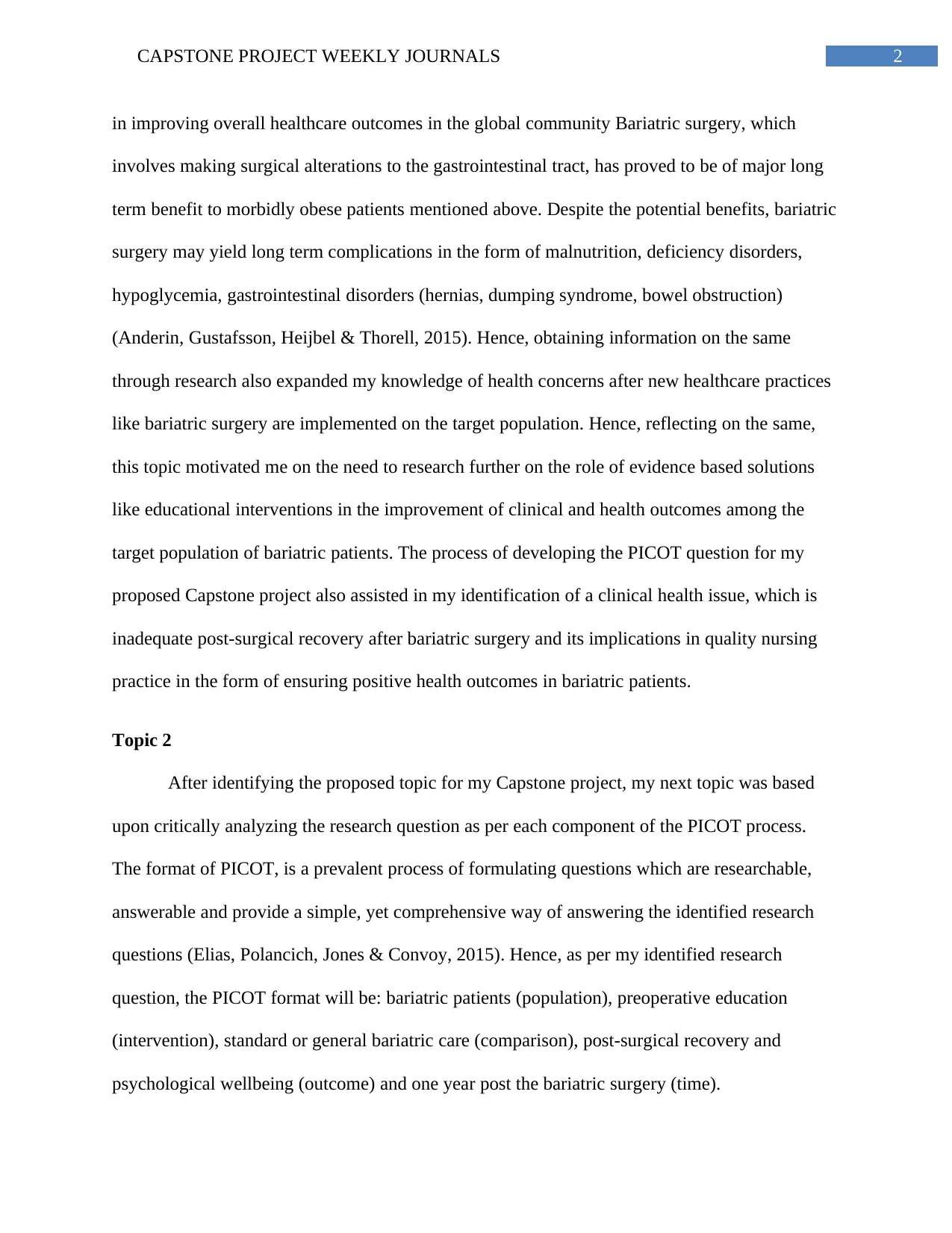
2CAPSTONE PROJECT WEEKLY JOURNALS
in improving overall healthcare outcomes in the global community Bariatric surgery, which
involves making surgical alterations to the gastrointestinal tract, has proved to be of major long
term benefit to morbidly obese patients mentioned above. Despite the potential benefits, bariatric
surgery may yield long term complications in the form of malnutrition, deficiency disorders,
hypoglycemia, gastrointestinal disorders (hernias, dumping syndrome, bowel obstruction)
(Anderin, Gustafsson, Heijbel & Thorell, 2015). Hence, obtaining information on the same
through research also expanded my knowledge of health concerns after new healthcare practices
like bariatric surgery are implemented on the target population. Hence, reflecting on the same,
this topic motivated me on the need to research further on the role of evidence based solutions
like educational interventions in the improvement of clinical and health outcomes among the
target population of bariatric patients. The process of developing the PICOT question for my
proposed Capstone project also assisted in my identification of a clinical health issue, which is
inadequate post-surgical recovery after bariatric surgery and its implications in quality nursing
practice in the form of ensuring positive health outcomes in bariatric patients.
Topic 2
After identifying the proposed topic for my Capstone project, my next topic was based
upon critically analyzing the research question as per each component of the PICOT process.
The format of PICOT, is a prevalent process of formulating questions which are researchable,
answerable and provide a simple, yet comprehensive way of answering the identified research
questions (Elias, Polancich, Jones & Convoy, 2015). Hence, as per my identified research
question, the PICOT format will be: bariatric patients (population), preoperative education
(intervention), standard or general bariatric care (comparison), post-surgical recovery and
psychological wellbeing (outcome) and one year post the bariatric surgery (time).
in improving overall healthcare outcomes in the global community Bariatric surgery, which
involves making surgical alterations to the gastrointestinal tract, has proved to be of major long
term benefit to morbidly obese patients mentioned above. Despite the potential benefits, bariatric
surgery may yield long term complications in the form of malnutrition, deficiency disorders,
hypoglycemia, gastrointestinal disorders (hernias, dumping syndrome, bowel obstruction)
(Anderin, Gustafsson, Heijbel & Thorell, 2015). Hence, obtaining information on the same
through research also expanded my knowledge of health concerns after new healthcare practices
like bariatric surgery are implemented on the target population. Hence, reflecting on the same,
this topic motivated me on the need to research further on the role of evidence based solutions
like educational interventions in the improvement of clinical and health outcomes among the
target population of bariatric patients. The process of developing the PICOT question for my
proposed Capstone project also assisted in my identification of a clinical health issue, which is
inadequate post-surgical recovery after bariatric surgery and its implications in quality nursing
practice in the form of ensuring positive health outcomes in bariatric patients.
Topic 2
After identifying the proposed topic for my Capstone project, my next topic was based
upon critically analyzing the research question as per each component of the PICOT process.
The format of PICOT, is a prevalent process of formulating questions which are researchable,
answerable and provide a simple, yet comprehensive way of answering the identified research
questions (Elias, Polancich, Jones & Convoy, 2015). Hence, as per my identified research
question, the PICOT format will be: bariatric patients (population), preoperative education
(intervention), standard or general bariatric care (comparison), post-surgical recovery and
psychological wellbeing (outcome) and one year post the bariatric surgery (time).
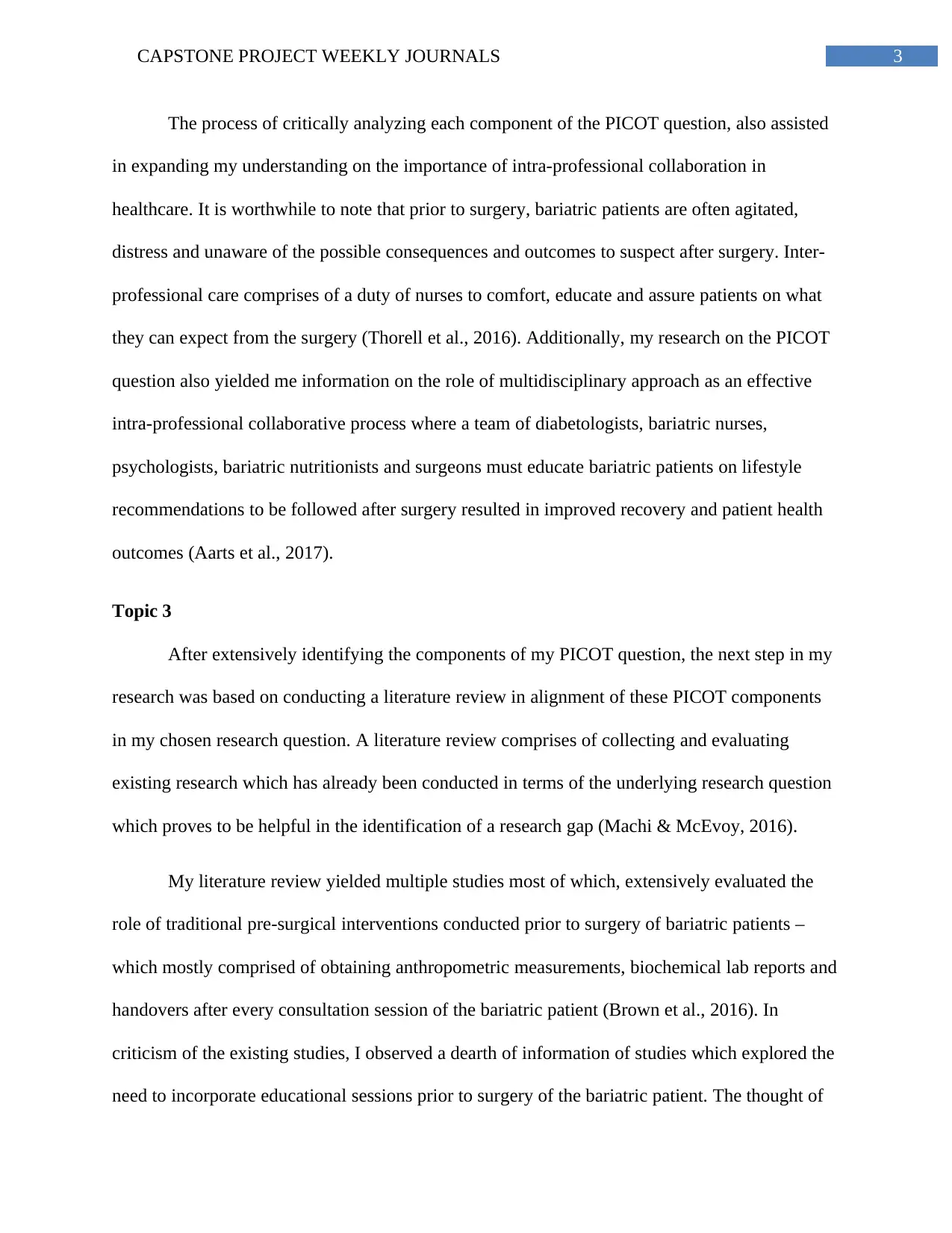
3CAPSTONE PROJECT WEEKLY JOURNALS
The process of critically analyzing each component of the PICOT question, also assisted
in expanding my understanding on the importance of intra-professional collaboration in
healthcare. It is worthwhile to note that prior to surgery, bariatric patients are often agitated,
distress and unaware of the possible consequences and outcomes to suspect after surgery. Inter-
professional care comprises of a duty of nurses to comfort, educate and assure patients on what
they can expect from the surgery (Thorell et al., 2016). Additionally, my research on the PICOT
question also yielded me information on the role of multidisciplinary approach as an effective
intra-professional collaborative process where a team of diabetologists, bariatric nurses,
psychologists, bariatric nutritionists and surgeons must educate bariatric patients on lifestyle
recommendations to be followed after surgery resulted in improved recovery and patient health
outcomes (Aarts et al., 2017).
Topic 3
After extensively identifying the components of my PICOT question, the next step in my
research was based on conducting a literature review in alignment of these PICOT components
in my chosen research question. A literature review comprises of collecting and evaluating
existing research which has already been conducted in terms of the underlying research question
which proves to be helpful in the identification of a research gap (Machi & McEvoy, 2016).
My literature review yielded multiple studies most of which, extensively evaluated the
role of traditional pre-surgical interventions conducted prior to surgery of bariatric patients –
which mostly comprised of obtaining anthropometric measurements, biochemical lab reports and
handovers after every consultation session of the bariatric patient (Brown et al., 2016). In
criticism of the existing studies, I observed a dearth of information of studies which explored the
need to incorporate educational sessions prior to surgery of the bariatric patient. The thought of
The process of critically analyzing each component of the PICOT question, also assisted
in expanding my understanding on the importance of intra-professional collaboration in
healthcare. It is worthwhile to note that prior to surgery, bariatric patients are often agitated,
distress and unaware of the possible consequences and outcomes to suspect after surgery. Inter-
professional care comprises of a duty of nurses to comfort, educate and assure patients on what
they can expect from the surgery (Thorell et al., 2016). Additionally, my research on the PICOT
question also yielded me information on the role of multidisciplinary approach as an effective
intra-professional collaborative process where a team of diabetologists, bariatric nurses,
psychologists, bariatric nutritionists and surgeons must educate bariatric patients on lifestyle
recommendations to be followed after surgery resulted in improved recovery and patient health
outcomes (Aarts et al., 2017).
Topic 3
After extensively identifying the components of my PICOT question, the next step in my
research was based on conducting a literature review in alignment of these PICOT components
in my chosen research question. A literature review comprises of collecting and evaluating
existing research which has already been conducted in terms of the underlying research question
which proves to be helpful in the identification of a research gap (Machi & McEvoy, 2016).
My literature review yielded multiple studies most of which, extensively evaluated the
role of traditional pre-surgical interventions conducted prior to surgery of bariatric patients –
which mostly comprised of obtaining anthropometric measurements, biochemical lab reports and
handovers after every consultation session of the bariatric patient (Brown et al., 2016). In
criticism of the existing studies, I observed a dearth of information of studies which explored the
need to incorporate educational sessions prior to surgery of the bariatric patient. The thought of
Secure Best Marks with AI Grader
Need help grading? Try our AI Grader for instant feedback on your assignments.
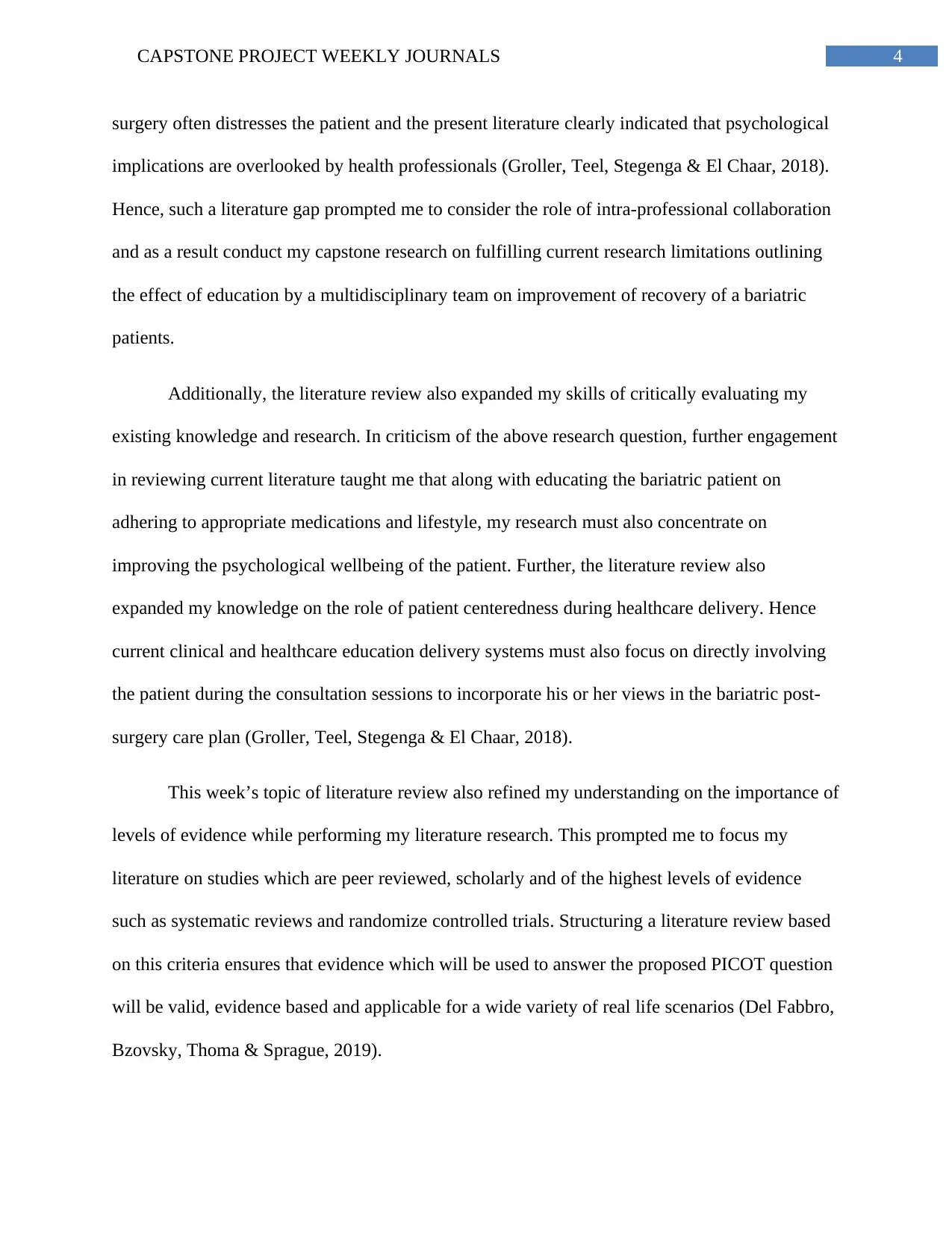
4CAPSTONE PROJECT WEEKLY JOURNALS
surgery often distresses the patient and the present literature clearly indicated that psychological
implications are overlooked by health professionals (Groller, Teel, Stegenga & El Chaar, 2018).
Hence, such a literature gap prompted me to consider the role of intra-professional collaboration
and as a result conduct my capstone research on fulfilling current research limitations outlining
the effect of education by a multidisciplinary team on improvement of recovery of a bariatric
patients.
Additionally, the literature review also expanded my skills of critically evaluating my
existing knowledge and research. In criticism of the above research question, further engagement
in reviewing current literature taught me that along with educating the bariatric patient on
adhering to appropriate medications and lifestyle, my research must also concentrate on
improving the psychological wellbeing of the patient. Further, the literature review also
expanded my knowledge on the role of patient centeredness during healthcare delivery. Hence
current clinical and healthcare education delivery systems must also focus on directly involving
the patient during the consultation sessions to incorporate his or her views in the bariatric post-
surgery care plan (Groller, Teel, Stegenga & El Chaar, 2018).
This week’s topic of literature review also refined my understanding on the importance of
levels of evidence while performing my literature research. This prompted me to focus my
literature on studies which are peer reviewed, scholarly and of the highest levels of evidence
such as systematic reviews and randomize controlled trials. Structuring a literature review based
on this criteria ensures that evidence which will be used to answer the proposed PICOT question
will be valid, evidence based and applicable for a wide variety of real life scenarios (Del Fabbro,
Bzovsky, Thoma & Sprague, 2019).
surgery often distresses the patient and the present literature clearly indicated that psychological
implications are overlooked by health professionals (Groller, Teel, Stegenga & El Chaar, 2018).
Hence, such a literature gap prompted me to consider the role of intra-professional collaboration
and as a result conduct my capstone research on fulfilling current research limitations outlining
the effect of education by a multidisciplinary team on improvement of recovery of a bariatric
patients.
Additionally, the literature review also expanded my skills of critically evaluating my
existing knowledge and research. In criticism of the above research question, further engagement
in reviewing current literature taught me that along with educating the bariatric patient on
adhering to appropriate medications and lifestyle, my research must also concentrate on
improving the psychological wellbeing of the patient. Further, the literature review also
expanded my knowledge on the role of patient centeredness during healthcare delivery. Hence
current clinical and healthcare education delivery systems must also focus on directly involving
the patient during the consultation sessions to incorporate his or her views in the bariatric post-
surgery care plan (Groller, Teel, Stegenga & El Chaar, 2018).
This week’s topic of literature review also refined my understanding on the importance of
levels of evidence while performing my literature research. This prompted me to focus my
literature on studies which are peer reviewed, scholarly and of the highest levels of evidence
such as systematic reviews and randomize controlled trials. Structuring a literature review based
on this criteria ensures that evidence which will be used to answer the proposed PICOT question
will be valid, evidence based and applicable for a wide variety of real life scenarios (Del Fabbro,
Bzovsky, Thoma & Sprague, 2019).
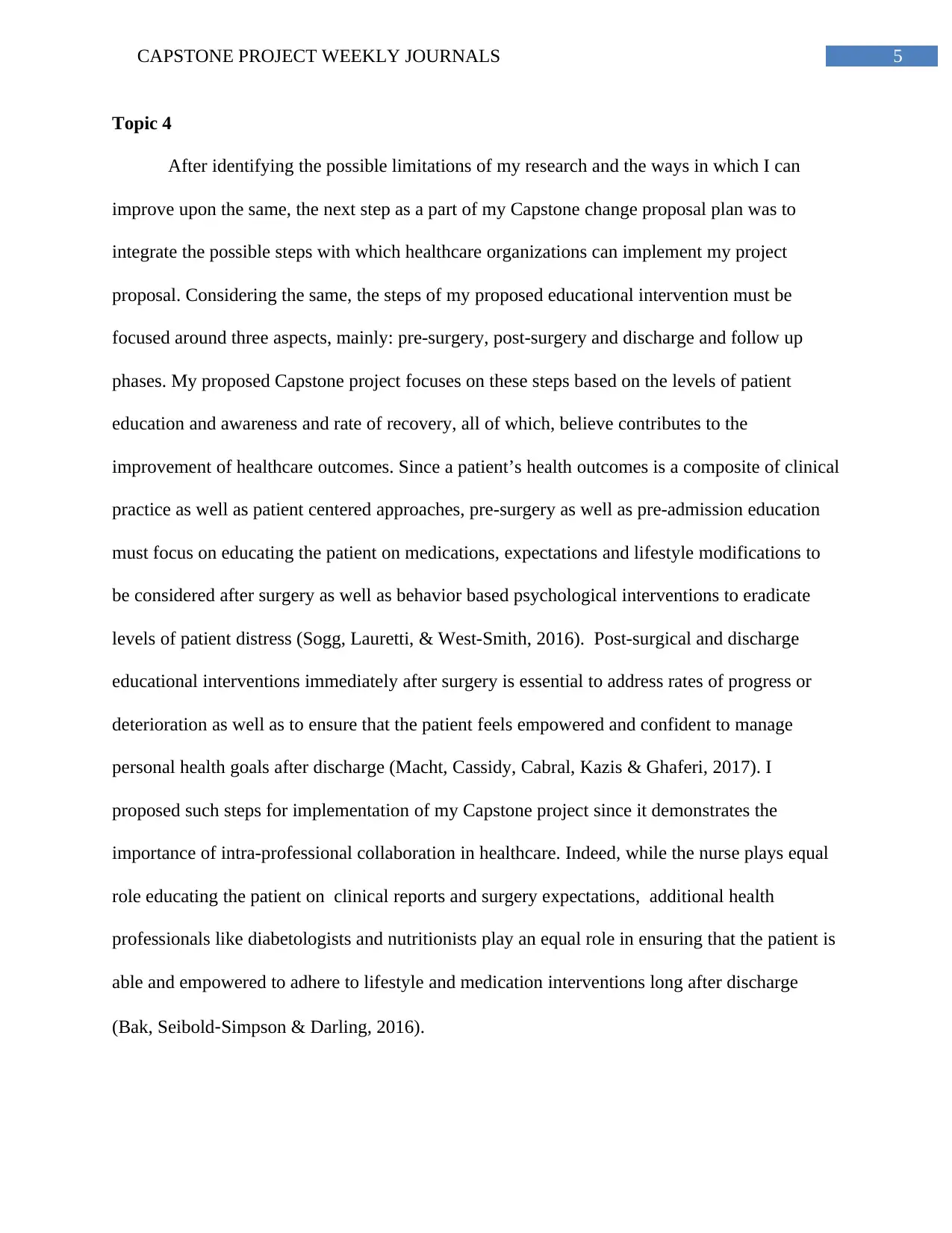
5CAPSTONE PROJECT WEEKLY JOURNALS
Topic 4
After identifying the possible limitations of my research and the ways in which I can
improve upon the same, the next step as a part of my Capstone change proposal plan was to
integrate the possible steps with which healthcare organizations can implement my project
proposal. Considering the same, the steps of my proposed educational intervention must be
focused around three aspects, mainly: pre-surgery, post-surgery and discharge and follow up
phases. My proposed Capstone project focuses on these steps based on the levels of patient
education and awareness and rate of recovery, all of which, believe contributes to the
improvement of healthcare outcomes. Since a patient’s health outcomes is a composite of clinical
practice as well as patient centered approaches, pre-surgery as well as pre-admission education
must focus on educating the patient on medications, expectations and lifestyle modifications to
be considered after surgery as well as behavior based psychological interventions to eradicate
levels of patient distress (Sogg, Lauretti, & West-Smith, 2016). Post-surgical and discharge
educational interventions immediately after surgery is essential to address rates of progress or
deterioration as well as to ensure that the patient feels empowered and confident to manage
personal health goals after discharge (Macht, Cassidy, Cabral, Kazis & Ghaferi, 2017). I
proposed such steps for implementation of my Capstone project since it demonstrates the
importance of intra-professional collaboration in healthcare. Indeed, while the nurse plays equal
role educating the patient on clinical reports and surgery expectations, additional health
professionals like diabetologists and nutritionists play an equal role in ensuring that the patient is
able and empowered to adhere to lifestyle and medication interventions long after discharge
(Bak, Seibold‐Simpson & Darling, 2016).
Topic 4
After identifying the possible limitations of my research and the ways in which I can
improve upon the same, the next step as a part of my Capstone change proposal plan was to
integrate the possible steps with which healthcare organizations can implement my project
proposal. Considering the same, the steps of my proposed educational intervention must be
focused around three aspects, mainly: pre-surgery, post-surgery and discharge and follow up
phases. My proposed Capstone project focuses on these steps based on the levels of patient
education and awareness and rate of recovery, all of which, believe contributes to the
improvement of healthcare outcomes. Since a patient’s health outcomes is a composite of clinical
practice as well as patient centered approaches, pre-surgery as well as pre-admission education
must focus on educating the patient on medications, expectations and lifestyle modifications to
be considered after surgery as well as behavior based psychological interventions to eradicate
levels of patient distress (Sogg, Lauretti, & West-Smith, 2016). Post-surgical and discharge
educational interventions immediately after surgery is essential to address rates of progress or
deterioration as well as to ensure that the patient feels empowered and confident to manage
personal health goals after discharge (Macht, Cassidy, Cabral, Kazis & Ghaferi, 2017). I
proposed such steps for implementation of my Capstone project since it demonstrates the
importance of intra-professional collaboration in healthcare. Indeed, while the nurse plays equal
role educating the patient on clinical reports and surgery expectations, additional health
professionals like diabetologists and nutritionists play an equal role in ensuring that the patient is
able and empowered to adhere to lifestyle and medication interventions long after discharge
(Bak, Seibold‐Simpson & Darling, 2016).
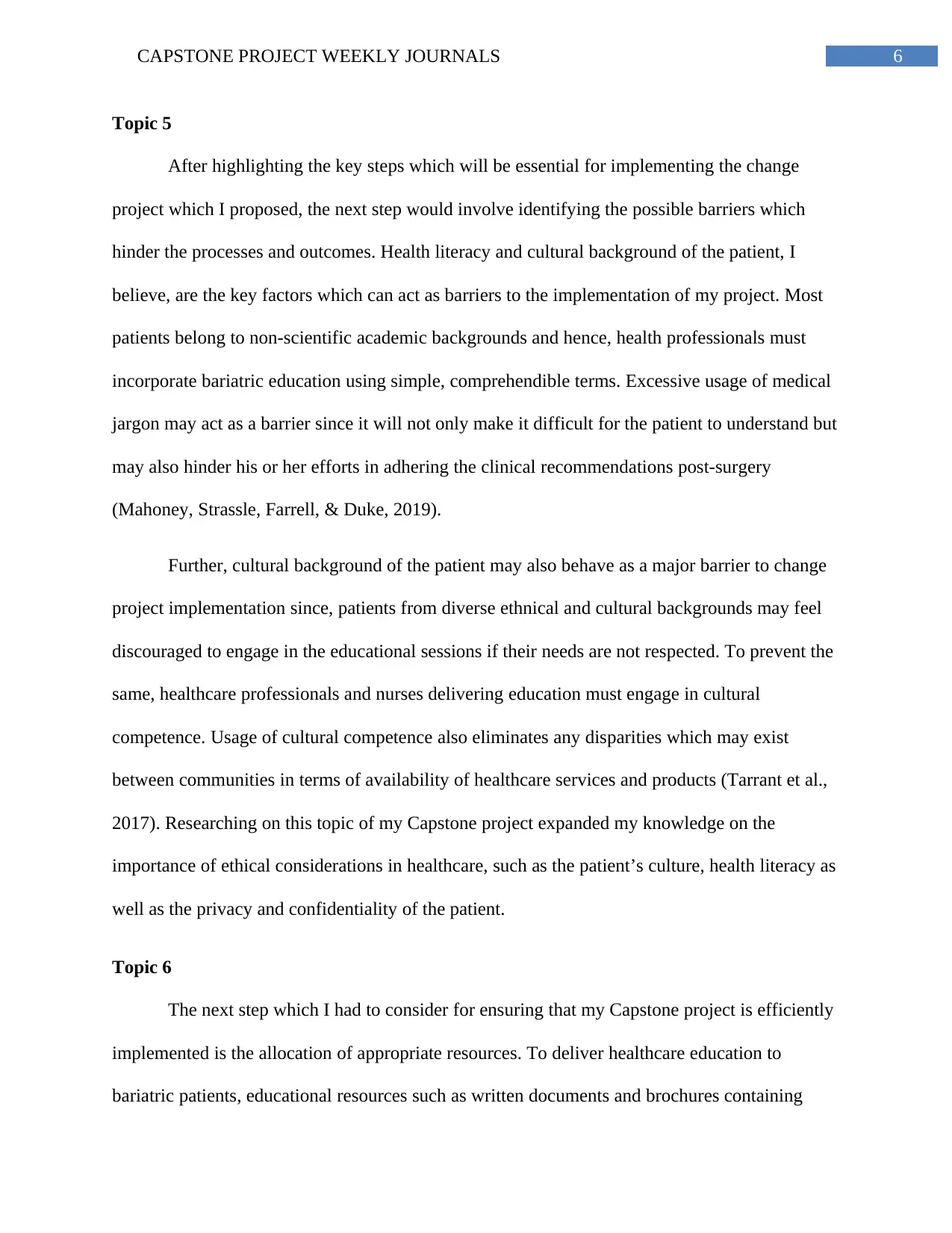
6CAPSTONE PROJECT WEEKLY JOURNALS
Topic 5
After highlighting the key steps which will be essential for implementing the change
project which I proposed, the next step would involve identifying the possible barriers which
hinder the processes and outcomes. Health literacy and cultural background of the patient, I
believe, are the key factors which can act as barriers to the implementation of my project. Most
patients belong to non-scientific academic backgrounds and hence, health professionals must
incorporate bariatric education using simple, comprehendible terms. Excessive usage of medical
jargon may act as a barrier since it will not only make it difficult for the patient to understand but
may also hinder his or her efforts in adhering the clinical recommendations post-surgery
(Mahoney, Strassle, Farrell, & Duke, 2019).
Further, cultural background of the patient may also behave as a major barrier to change
project implementation since, patients from diverse ethnical and cultural backgrounds may feel
discouraged to engage in the educational sessions if their needs are not respected. To prevent the
same, healthcare professionals and nurses delivering education must engage in cultural
competence. Usage of cultural competence also eliminates any disparities which may exist
between communities in terms of availability of healthcare services and products (Tarrant et al.,
2017). Researching on this topic of my Capstone project expanded my knowledge on the
importance of ethical considerations in healthcare, such as the patient’s culture, health literacy as
well as the privacy and confidentiality of the patient.
Topic 6
The next step which I had to consider for ensuring that my Capstone project is efficiently
implemented is the allocation of appropriate resources. To deliver healthcare education to
bariatric patients, educational resources such as written documents and brochures containing
Topic 5
After highlighting the key steps which will be essential for implementing the change
project which I proposed, the next step would involve identifying the possible barriers which
hinder the processes and outcomes. Health literacy and cultural background of the patient, I
believe, are the key factors which can act as barriers to the implementation of my project. Most
patients belong to non-scientific academic backgrounds and hence, health professionals must
incorporate bariatric education using simple, comprehendible terms. Excessive usage of medical
jargon may act as a barrier since it will not only make it difficult for the patient to understand but
may also hinder his or her efforts in adhering the clinical recommendations post-surgery
(Mahoney, Strassle, Farrell, & Duke, 2019).
Further, cultural background of the patient may also behave as a major barrier to change
project implementation since, patients from diverse ethnical and cultural backgrounds may feel
discouraged to engage in the educational sessions if their needs are not respected. To prevent the
same, healthcare professionals and nurses delivering education must engage in cultural
competence. Usage of cultural competence also eliminates any disparities which may exist
between communities in terms of availability of healthcare services and products (Tarrant et al.,
2017). Researching on this topic of my Capstone project expanded my knowledge on the
importance of ethical considerations in healthcare, such as the patient’s culture, health literacy as
well as the privacy and confidentiality of the patient.
Topic 6
The next step which I had to consider for ensuring that my Capstone project is efficiently
implemented is the allocation of appropriate resources. To deliver healthcare education to
bariatric patients, educational resources such as written documents and brochures containing
Paraphrase This Document
Need a fresh take? Get an instant paraphrase of this document with our AI Paraphraser
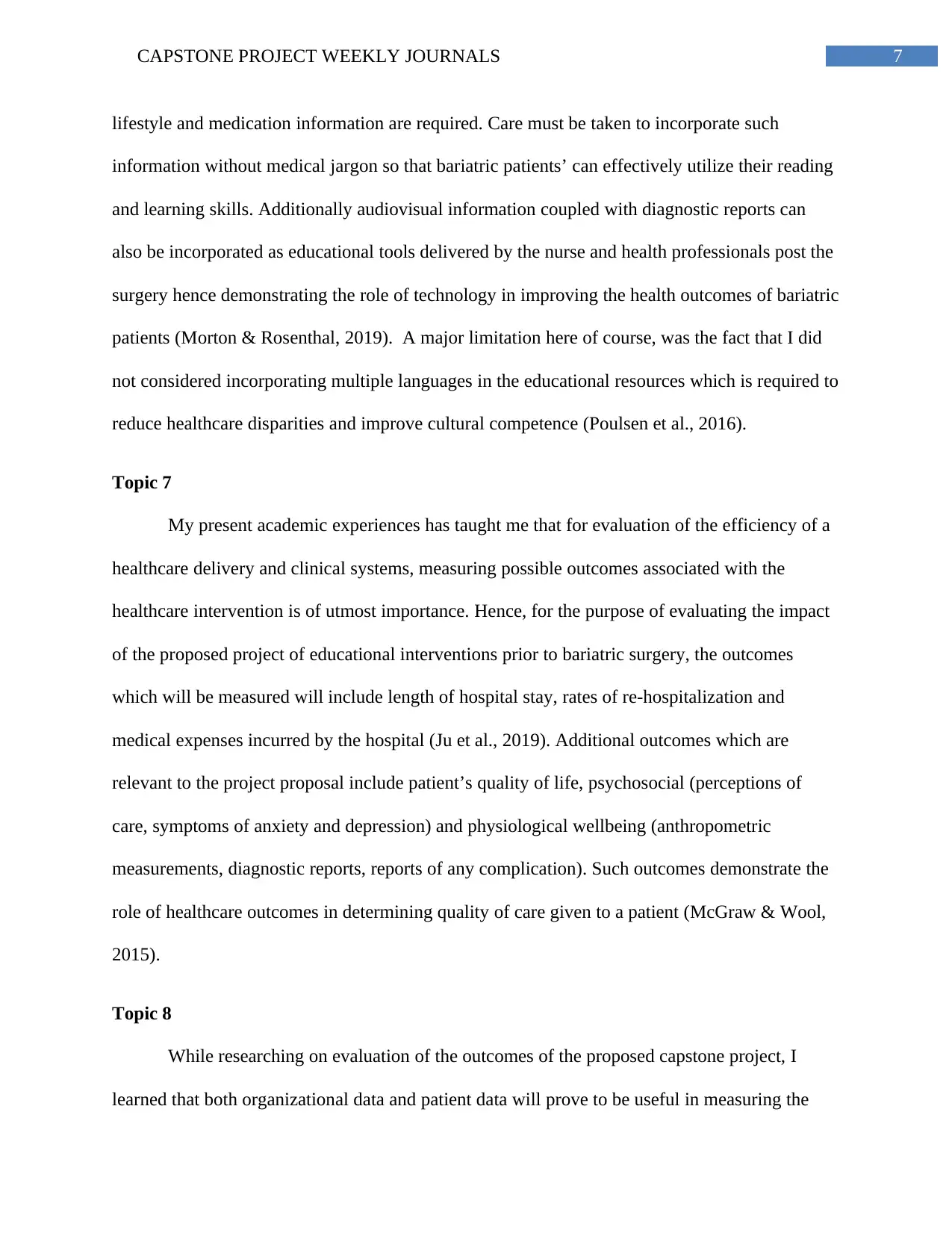
7CAPSTONE PROJECT WEEKLY JOURNALS
lifestyle and medication information are required. Care must be taken to incorporate such
information without medical jargon so that bariatric patients’ can effectively utilize their reading
and learning skills. Additionally audiovisual information coupled with diagnostic reports can
also be incorporated as educational tools delivered by the nurse and health professionals post the
surgery hence demonstrating the role of technology in improving the health outcomes of bariatric
patients (Morton & Rosenthal, 2019). A major limitation here of course, was the fact that I did
not considered incorporating multiple languages in the educational resources which is required to
reduce healthcare disparities and improve cultural competence (Poulsen et al., 2016).
Topic 7
My present academic experiences has taught me that for evaluation of the efficiency of a
healthcare delivery and clinical systems, measuring possible outcomes associated with the
healthcare intervention is of utmost importance. Hence, for the purpose of evaluating the impact
of the proposed project of educational interventions prior to bariatric surgery, the outcomes
which will be measured will include length of hospital stay, rates of re-hospitalization and
medical expenses incurred by the hospital (Ju et al., 2019). Additional outcomes which are
relevant to the project proposal include patient’s quality of life, psychosocial (perceptions of
care, symptoms of anxiety and depression) and physiological wellbeing (anthropometric
measurements, diagnostic reports, reports of any complication). Such outcomes demonstrate the
role of healthcare outcomes in determining quality of care given to a patient (McGraw & Wool,
2015).
Topic 8
While researching on evaluation of the outcomes of the proposed capstone project, I
learned that both organizational data and patient data will prove to be useful in measuring the
lifestyle and medication information are required. Care must be taken to incorporate such
information without medical jargon so that bariatric patients’ can effectively utilize their reading
and learning skills. Additionally audiovisual information coupled with diagnostic reports can
also be incorporated as educational tools delivered by the nurse and health professionals post the
surgery hence demonstrating the role of technology in improving the health outcomes of bariatric
patients (Morton & Rosenthal, 2019). A major limitation here of course, was the fact that I did
not considered incorporating multiple languages in the educational resources which is required to
reduce healthcare disparities and improve cultural competence (Poulsen et al., 2016).
Topic 7
My present academic experiences has taught me that for evaluation of the efficiency of a
healthcare delivery and clinical systems, measuring possible outcomes associated with the
healthcare intervention is of utmost importance. Hence, for the purpose of evaluating the impact
of the proposed project of educational interventions prior to bariatric surgery, the outcomes
which will be measured will include length of hospital stay, rates of re-hospitalization and
medical expenses incurred by the hospital (Ju et al., 2019). Additional outcomes which are
relevant to the project proposal include patient’s quality of life, psychosocial (perceptions of
care, symptoms of anxiety and depression) and physiological wellbeing (anthropometric
measurements, diagnostic reports, reports of any complication). Such outcomes demonstrate the
role of healthcare outcomes in determining quality of care given to a patient (McGraw & Wool,
2015).
Topic 8
While researching on evaluation of the outcomes of the proposed capstone project, I
learned that both organizational data and patient data will prove to be useful in measuring the
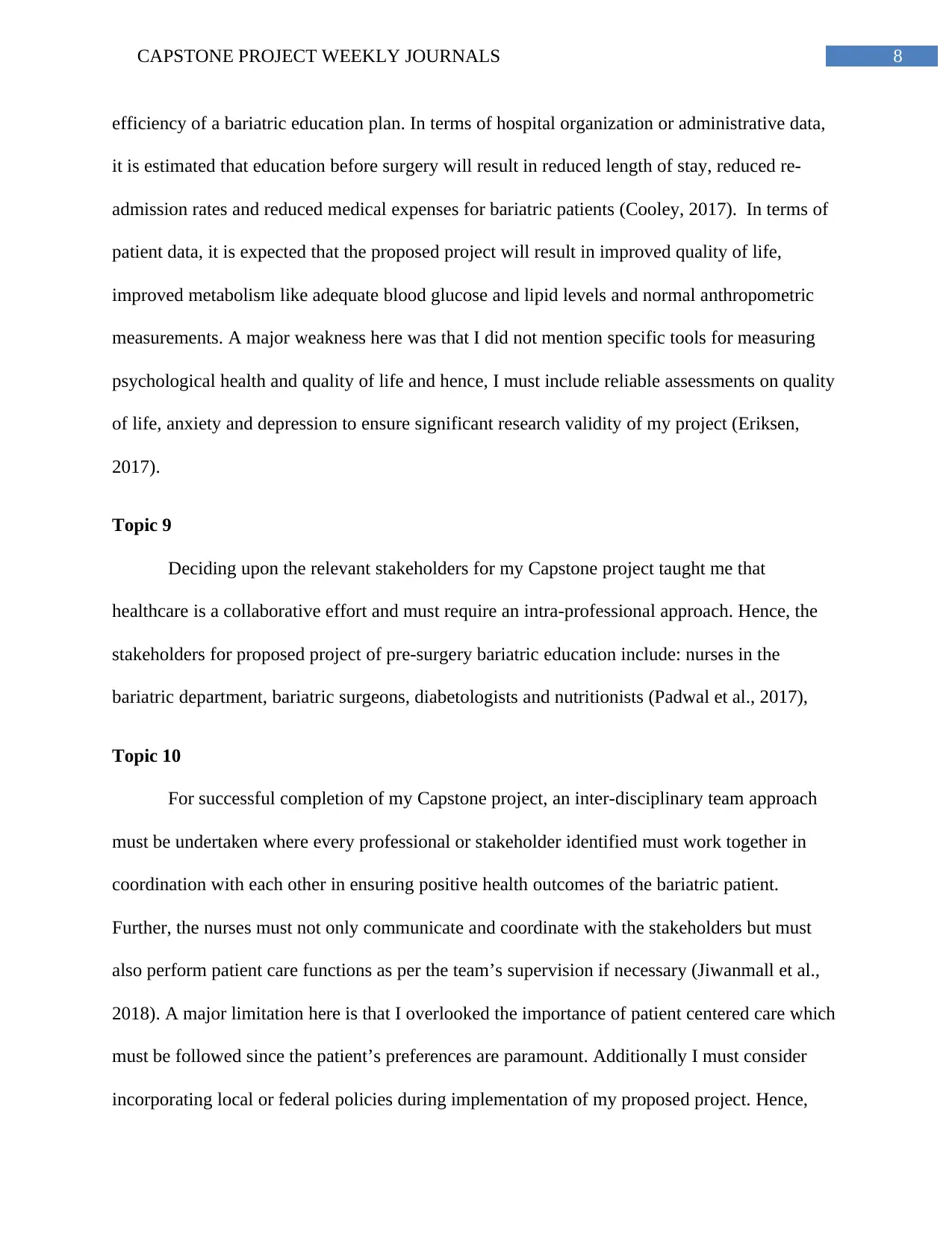
8CAPSTONE PROJECT WEEKLY JOURNALS
efficiency of a bariatric education plan. In terms of hospital organization or administrative data,
it is estimated that education before surgery will result in reduced length of stay, reduced re-
admission rates and reduced medical expenses for bariatric patients (Cooley, 2017). In terms of
patient data, it is expected that the proposed project will result in improved quality of life,
improved metabolism like adequate blood glucose and lipid levels and normal anthropometric
measurements. A major weakness here was that I did not mention specific tools for measuring
psychological health and quality of life and hence, I must include reliable assessments on quality
of life, anxiety and depression to ensure significant research validity of my project (Eriksen,
2017).
Topic 9
Deciding upon the relevant stakeholders for my Capstone project taught me that
healthcare is a collaborative effort and must require an intra-professional approach. Hence, the
stakeholders for proposed project of pre-surgery bariatric education include: nurses in the
bariatric department, bariatric surgeons, diabetologists and nutritionists (Padwal et al., 2017),
Topic 10
For successful completion of my Capstone project, an inter-disciplinary team approach
must be undertaken where every professional or stakeholder identified must work together in
coordination with each other in ensuring positive health outcomes of the bariatric patient.
Further, the nurses must not only communicate and coordinate with the stakeholders but must
also perform patient care functions as per the team’s supervision if necessary (Jiwanmall et al.,
2018). A major limitation here is that I overlooked the importance of patient centered care which
must be followed since the patient’s preferences are paramount. Additionally I must consider
incorporating local or federal policies during implementation of my proposed project. Hence,
efficiency of a bariatric education plan. In terms of hospital organization or administrative data,
it is estimated that education before surgery will result in reduced length of stay, reduced re-
admission rates and reduced medical expenses for bariatric patients (Cooley, 2017). In terms of
patient data, it is expected that the proposed project will result in improved quality of life,
improved metabolism like adequate blood glucose and lipid levels and normal anthropometric
measurements. A major weakness here was that I did not mention specific tools for measuring
psychological health and quality of life and hence, I must include reliable assessments on quality
of life, anxiety and depression to ensure significant research validity of my project (Eriksen,
2017).
Topic 9
Deciding upon the relevant stakeholders for my Capstone project taught me that
healthcare is a collaborative effort and must require an intra-professional approach. Hence, the
stakeholders for proposed project of pre-surgery bariatric education include: nurses in the
bariatric department, bariatric surgeons, diabetologists and nutritionists (Padwal et al., 2017),
Topic 10
For successful completion of my Capstone project, an inter-disciplinary team approach
must be undertaken where every professional or stakeholder identified must work together in
coordination with each other in ensuring positive health outcomes of the bariatric patient.
Further, the nurses must not only communicate and coordinate with the stakeholders but must
also perform patient care functions as per the team’s supervision if necessary (Jiwanmall et al.,
2018). A major limitation here is that I overlooked the importance of patient centered care which
must be followed since the patient’s preferences are paramount. Additionally I must consider
incorporating local or federal policies during implementation of my proposed project. Hence,
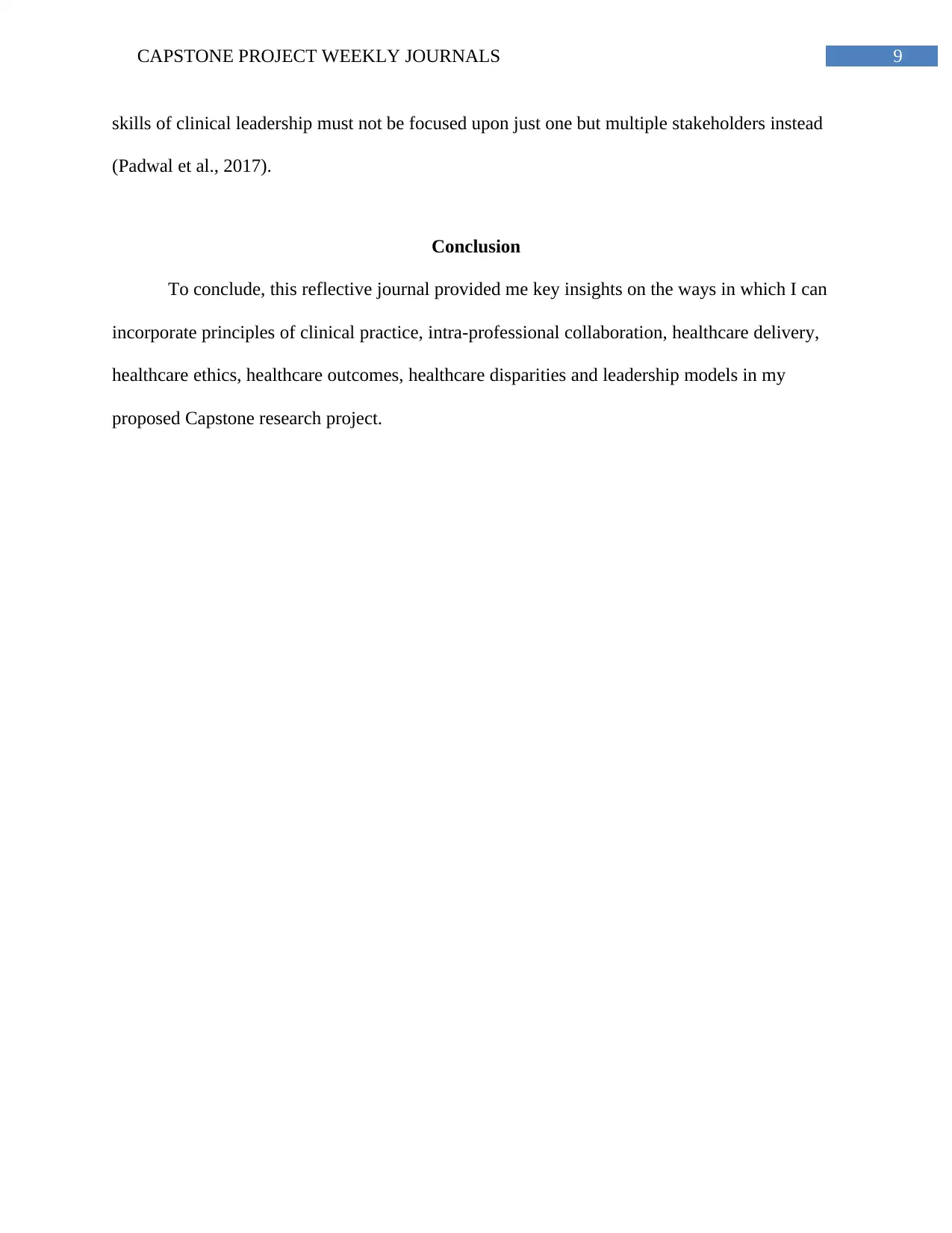
9CAPSTONE PROJECT WEEKLY JOURNALS
skills of clinical leadership must not be focused upon just one but multiple stakeholders instead
(Padwal et al., 2017).
Conclusion
To conclude, this reflective journal provided me key insights on the ways in which I can
incorporate principles of clinical practice, intra-professional collaboration, healthcare delivery,
healthcare ethics, healthcare outcomes, healthcare disparities and leadership models in my
proposed Capstone research project.
skills of clinical leadership must not be focused upon just one but multiple stakeholders instead
(Padwal et al., 2017).
Conclusion
To conclude, this reflective journal provided me key insights on the ways in which I can
incorporate principles of clinical practice, intra-professional collaboration, healthcare delivery,
healthcare ethics, healthcare outcomes, healthcare disparities and leadership models in my
proposed Capstone research project.
Secure Best Marks with AI Grader
Need help grading? Try our AI Grader for instant feedback on your assignments.
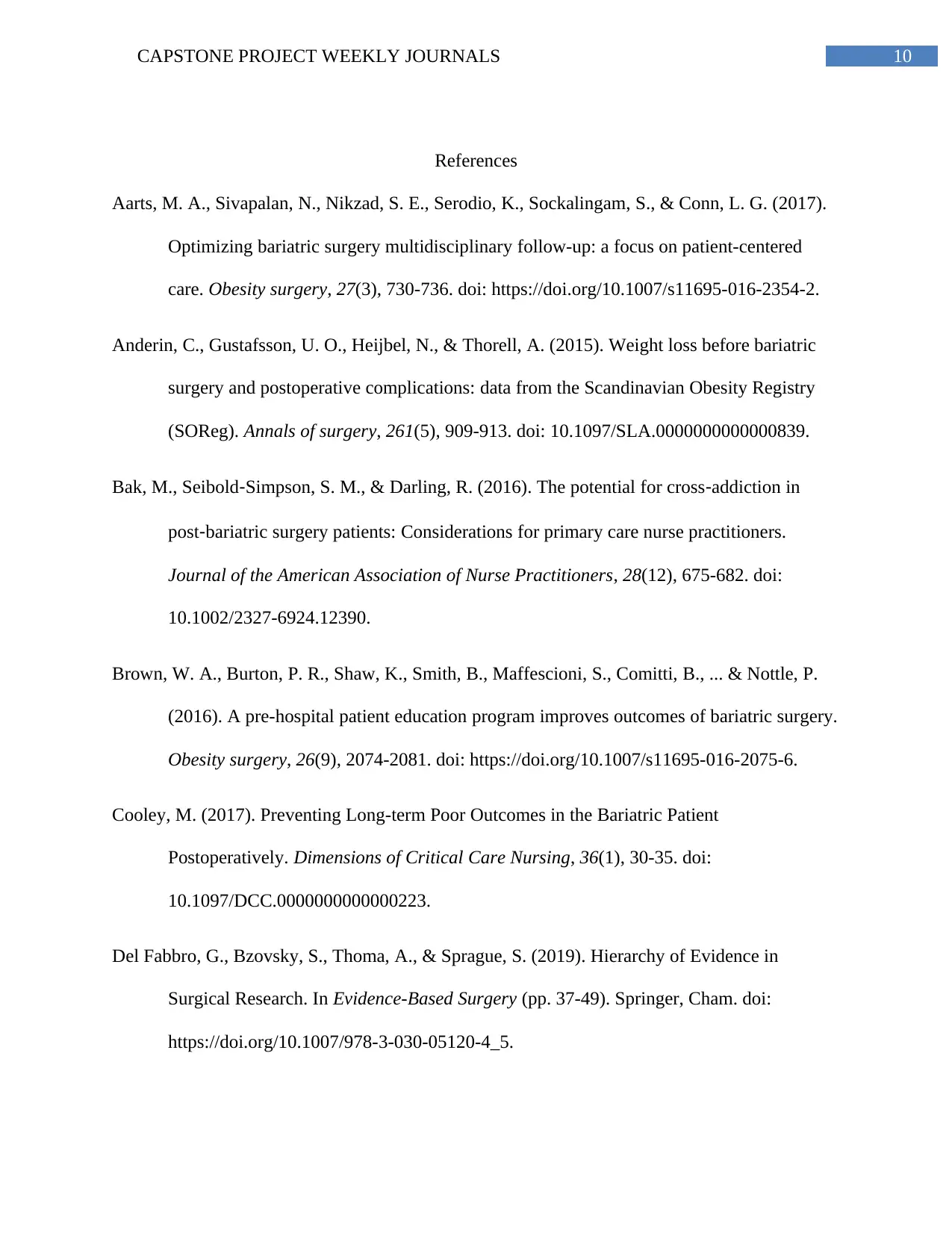
10CAPSTONE PROJECT WEEKLY JOURNALS
References
Aarts, M. A., Sivapalan, N., Nikzad, S. E., Serodio, K., Sockalingam, S., & Conn, L. G. (2017).
Optimizing bariatric surgery multidisciplinary follow-up: a focus on patient-centered
care. Obesity surgery, 27(3), 730-736. doi: https://doi.org/10.1007/s11695-016-2354-2.
Anderin, C., Gustafsson, U. O., Heijbel, N., & Thorell, A. (2015). Weight loss before bariatric
surgery and postoperative complications: data from the Scandinavian Obesity Registry
(SOReg). Annals of surgery, 261(5), 909-913. doi: 10.1097/SLA.0000000000000839.
Bak, M., Seibold‐Simpson, S. M., & Darling, R. (2016). The potential for cross‐addiction in
post‐bariatric surgery patients: Considerations for primary care nurse practitioners.
Journal of the American Association of Nurse Practitioners, 28(12), 675-682. doi:
10.1002/2327-6924.12390.
Brown, W. A., Burton, P. R., Shaw, K., Smith, B., Maffescioni, S., Comitti, B., ... & Nottle, P.
(2016). A pre-hospital patient education program improves outcomes of bariatric surgery.
Obesity surgery, 26(9), 2074-2081. doi: https://doi.org/10.1007/s11695-016-2075-6.
Cooley, M. (2017). Preventing Long-term Poor Outcomes in the Bariatric Patient
Postoperatively. Dimensions of Critical Care Nursing, 36(1), 30-35. doi:
10.1097/DCC.0000000000000223.
Del Fabbro, G., Bzovsky, S., Thoma, A., & Sprague, S. (2019). Hierarchy of Evidence in
Surgical Research. In Evidence-Based Surgery (pp. 37-49). Springer, Cham. doi:
https://doi.org/10.1007/978-3-030-05120-4_5.
References
Aarts, M. A., Sivapalan, N., Nikzad, S. E., Serodio, K., Sockalingam, S., & Conn, L. G. (2017).
Optimizing bariatric surgery multidisciplinary follow-up: a focus on patient-centered
care. Obesity surgery, 27(3), 730-736. doi: https://doi.org/10.1007/s11695-016-2354-2.
Anderin, C., Gustafsson, U. O., Heijbel, N., & Thorell, A. (2015). Weight loss before bariatric
surgery and postoperative complications: data from the Scandinavian Obesity Registry
(SOReg). Annals of surgery, 261(5), 909-913. doi: 10.1097/SLA.0000000000000839.
Bak, M., Seibold‐Simpson, S. M., & Darling, R. (2016). The potential for cross‐addiction in
post‐bariatric surgery patients: Considerations for primary care nurse practitioners.
Journal of the American Association of Nurse Practitioners, 28(12), 675-682. doi:
10.1002/2327-6924.12390.
Brown, W. A., Burton, P. R., Shaw, K., Smith, B., Maffescioni, S., Comitti, B., ... & Nottle, P.
(2016). A pre-hospital patient education program improves outcomes of bariatric surgery.
Obesity surgery, 26(9), 2074-2081. doi: https://doi.org/10.1007/s11695-016-2075-6.
Cooley, M. (2017). Preventing Long-term Poor Outcomes in the Bariatric Patient
Postoperatively. Dimensions of Critical Care Nursing, 36(1), 30-35. doi:
10.1097/DCC.0000000000000223.
Del Fabbro, G., Bzovsky, S., Thoma, A., & Sprague, S. (2019). Hierarchy of Evidence in
Surgical Research. In Evidence-Based Surgery (pp. 37-49). Springer, Cham. doi:
https://doi.org/10.1007/978-3-030-05120-4_5.
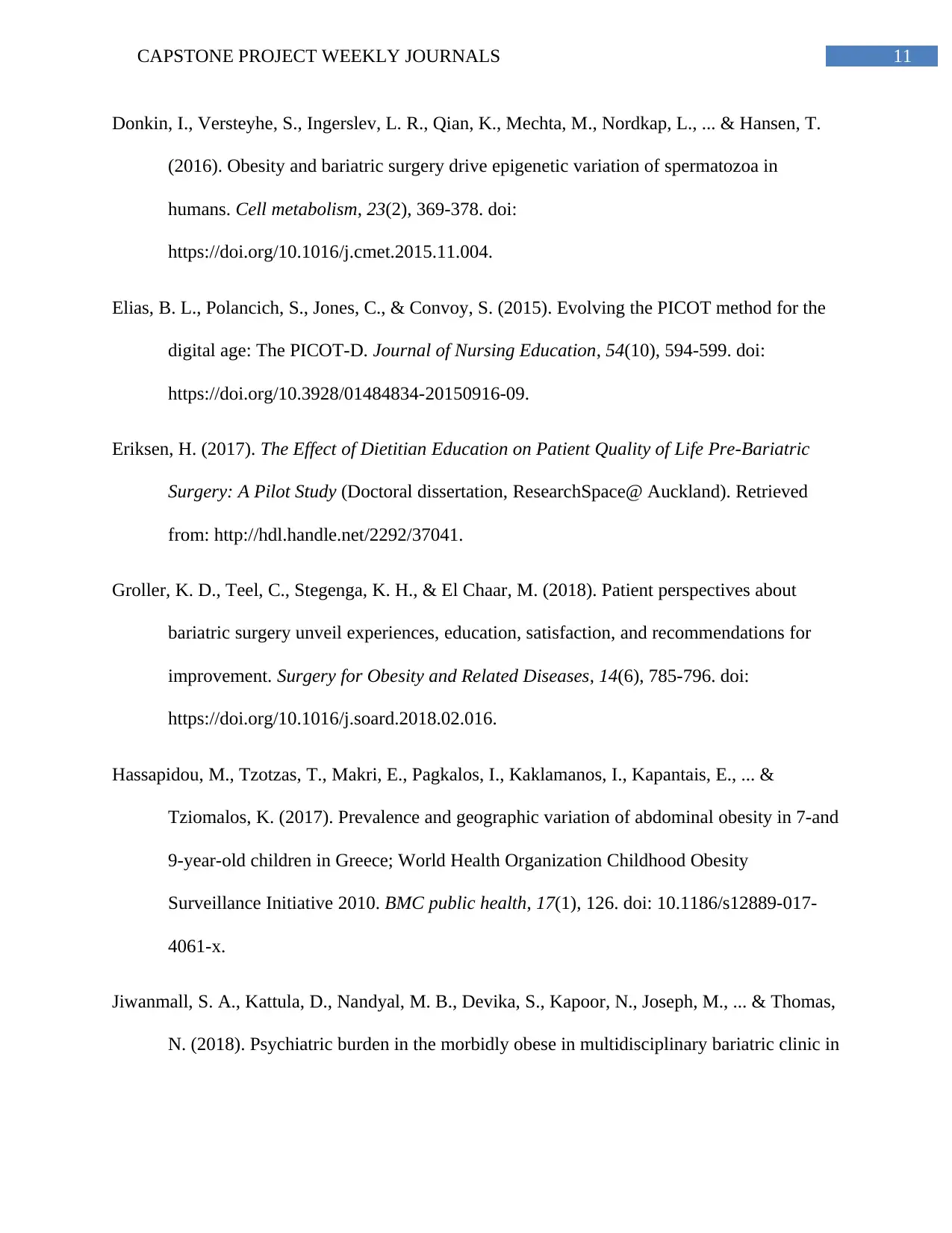
11CAPSTONE PROJECT WEEKLY JOURNALS
Donkin, I., Versteyhe, S., Ingerslev, L. R., Qian, K., Mechta, M., Nordkap, L., ... & Hansen, T.
(2016). Obesity and bariatric surgery drive epigenetic variation of spermatozoa in
humans. Cell metabolism, 23(2), 369-378. doi:
https://doi.org/10.1016/j.cmet.2015.11.004.
Elias, B. L., Polancich, S., Jones, C., & Convoy, S. (2015). Evolving the PICOT method for the
digital age: The PICOT-D. Journal of Nursing Education, 54(10), 594-599. doi:
https://doi.org/10.3928/01484834-20150916-09.
Eriksen, H. (2017). The Effect of Dietitian Education on Patient Quality of Life Pre-Bariatric
Surgery: A Pilot Study (Doctoral dissertation, ResearchSpace@ Auckland). Retrieved
from: http://hdl.handle.net/2292/37041.
Groller, K. D., Teel, C., Stegenga, K. H., & El Chaar, M. (2018). Patient perspectives about
bariatric surgery unveil experiences, education, satisfaction, and recommendations for
improvement. Surgery for Obesity and Related Diseases, 14(6), 785-796. doi:
https://doi.org/10.1016/j.soard.2018.02.016.
Hassapidou, M., Tzotzas, T., Makri, E., Pagkalos, I., Kaklamanos, I., Kapantais, E., ... &
Tziomalos, K. (2017). Prevalence and geographic variation of abdominal obesity in 7-and
9-year-old children in Greece; World Health Organization Childhood Obesity
Surveillance Initiative 2010. BMC public health, 17(1), 126. doi: 10.1186/s12889-017-
4061-x.
Jiwanmall, S. A., Kattula, D., Nandyal, M. B., Devika, S., Kapoor, N., Joseph, M., ... & Thomas,
N. (2018). Psychiatric burden in the morbidly obese in multidisciplinary bariatric clinic in
Donkin, I., Versteyhe, S., Ingerslev, L. R., Qian, K., Mechta, M., Nordkap, L., ... & Hansen, T.
(2016). Obesity and bariatric surgery drive epigenetic variation of spermatozoa in
humans. Cell metabolism, 23(2), 369-378. doi:
https://doi.org/10.1016/j.cmet.2015.11.004.
Elias, B. L., Polancich, S., Jones, C., & Convoy, S. (2015). Evolving the PICOT method for the
digital age: The PICOT-D. Journal of Nursing Education, 54(10), 594-599. doi:
https://doi.org/10.3928/01484834-20150916-09.
Eriksen, H. (2017). The Effect of Dietitian Education on Patient Quality of Life Pre-Bariatric
Surgery: A Pilot Study (Doctoral dissertation, ResearchSpace@ Auckland). Retrieved
from: http://hdl.handle.net/2292/37041.
Groller, K. D., Teel, C., Stegenga, K. H., & El Chaar, M. (2018). Patient perspectives about
bariatric surgery unveil experiences, education, satisfaction, and recommendations for
improvement. Surgery for Obesity and Related Diseases, 14(6), 785-796. doi:
https://doi.org/10.1016/j.soard.2018.02.016.
Hassapidou, M., Tzotzas, T., Makri, E., Pagkalos, I., Kaklamanos, I., Kapantais, E., ... &
Tziomalos, K. (2017). Prevalence and geographic variation of abdominal obesity in 7-and
9-year-old children in Greece; World Health Organization Childhood Obesity
Surveillance Initiative 2010. BMC public health, 17(1), 126. doi: 10.1186/s12889-017-
4061-x.
Jiwanmall, S. A., Kattula, D., Nandyal, M. B., Devika, S., Kapoor, N., Joseph, M., ... & Thomas,
N. (2018). Psychiatric burden in the morbidly obese in multidisciplinary bariatric clinic in
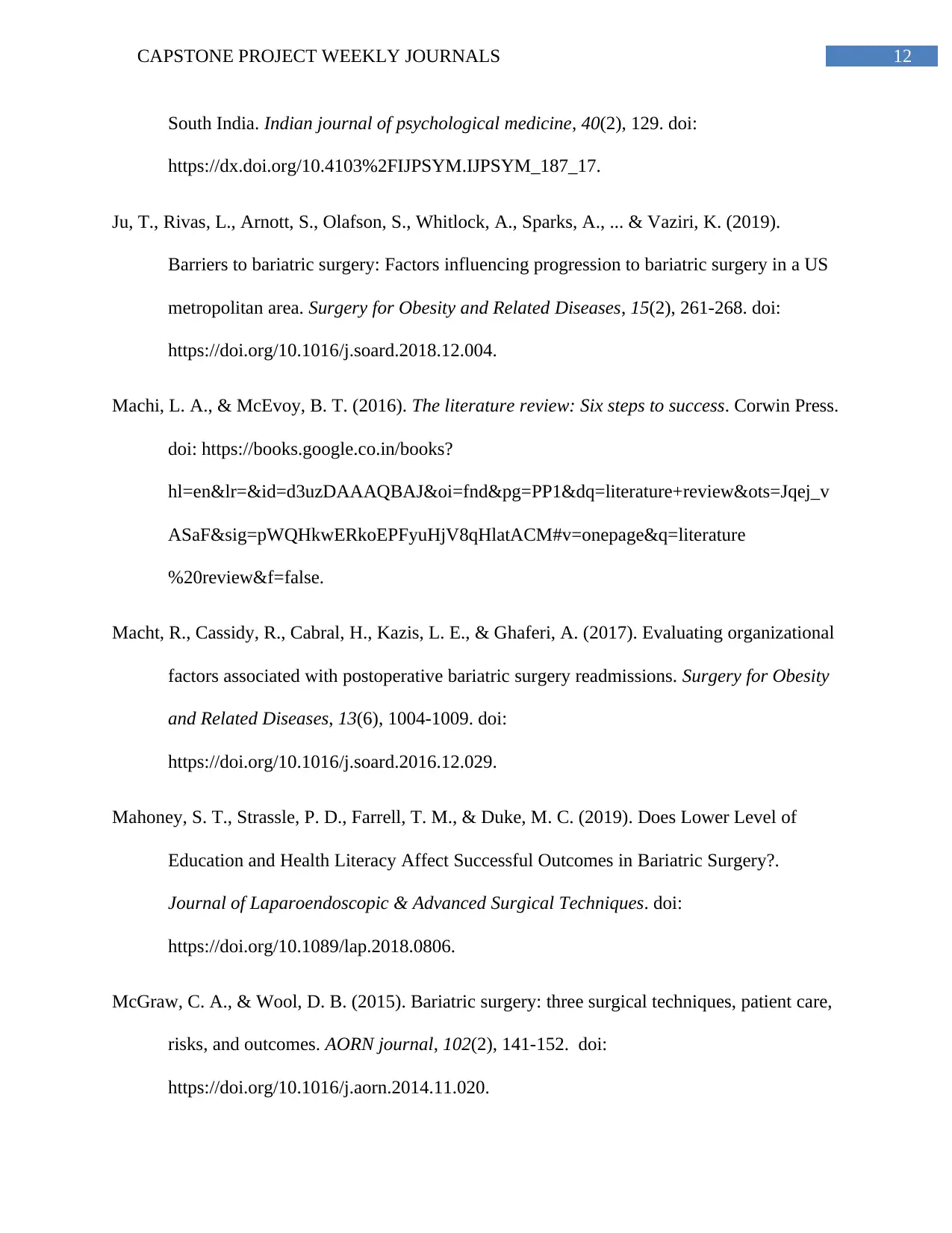
12CAPSTONE PROJECT WEEKLY JOURNALS
South India. Indian journal of psychological medicine, 40(2), 129. doi:
https://dx.doi.org/10.4103%2FIJPSYM.IJPSYM_187_17.
Ju, T., Rivas, L., Arnott, S., Olafson, S., Whitlock, A., Sparks, A., ... & Vaziri, K. (2019).
Barriers to bariatric surgery: Factors influencing progression to bariatric surgery in a US
metropolitan area. Surgery for Obesity and Related Diseases, 15(2), 261-268. doi:
https://doi.org/10.1016/j.soard.2018.12.004.
Machi, L. A., & McEvoy, B. T. (2016). The literature review: Six steps to success. Corwin Press.
doi: https://books.google.co.in/books?
hl=en&lr=&id=d3uzDAAAQBAJ&oi=fnd&pg=PP1&dq=literature+review&ots=Jqej_v
ASaF&sig=pWQHkwERkoEPFyuHjV8qHlatACM#v=onepage&q=literature
%20review&f=false.
Macht, R., Cassidy, R., Cabral, H., Kazis, L. E., & Ghaferi, A. (2017). Evaluating organizational
factors associated with postoperative bariatric surgery readmissions. Surgery for Obesity
and Related Diseases, 13(6), 1004-1009. doi:
https://doi.org/10.1016/j.soard.2016.12.029.
Mahoney, S. T., Strassle, P. D., Farrell, T. M., & Duke, M. C. (2019). Does Lower Level of
Education and Health Literacy Affect Successful Outcomes in Bariatric Surgery?.
Journal of Laparoendoscopic & Advanced Surgical Techniques. doi:
https://doi.org/10.1089/lap.2018.0806.
McGraw, C. A., & Wool, D. B. (2015). Bariatric surgery: three surgical techniques, patient care,
risks, and outcomes. AORN journal, 102(2), 141-152. doi:
https://doi.org/10.1016/j.aorn.2014.11.020.
South India. Indian journal of psychological medicine, 40(2), 129. doi:
https://dx.doi.org/10.4103%2FIJPSYM.IJPSYM_187_17.
Ju, T., Rivas, L., Arnott, S., Olafson, S., Whitlock, A., Sparks, A., ... & Vaziri, K. (2019).
Barriers to bariatric surgery: Factors influencing progression to bariatric surgery in a US
metropolitan area. Surgery for Obesity and Related Diseases, 15(2), 261-268. doi:
https://doi.org/10.1016/j.soard.2018.12.004.
Machi, L. A., & McEvoy, B. T. (2016). The literature review: Six steps to success. Corwin Press.
doi: https://books.google.co.in/books?
hl=en&lr=&id=d3uzDAAAQBAJ&oi=fnd&pg=PP1&dq=literature+review&ots=Jqej_v
ASaF&sig=pWQHkwERkoEPFyuHjV8qHlatACM#v=onepage&q=literature
%20review&f=false.
Macht, R., Cassidy, R., Cabral, H., Kazis, L. E., & Ghaferi, A. (2017). Evaluating organizational
factors associated with postoperative bariatric surgery readmissions. Surgery for Obesity
and Related Diseases, 13(6), 1004-1009. doi:
https://doi.org/10.1016/j.soard.2016.12.029.
Mahoney, S. T., Strassle, P. D., Farrell, T. M., & Duke, M. C. (2019). Does Lower Level of
Education and Health Literacy Affect Successful Outcomes in Bariatric Surgery?.
Journal of Laparoendoscopic & Advanced Surgical Techniques. doi:
https://doi.org/10.1089/lap.2018.0806.
McGraw, C. A., & Wool, D. B. (2015). Bariatric surgery: three surgical techniques, patient care,
risks, and outcomes. AORN journal, 102(2), 141-152. doi:
https://doi.org/10.1016/j.aorn.2014.11.020.
Paraphrase This Document
Need a fresh take? Get an instant paraphrase of this document with our AI Paraphraser
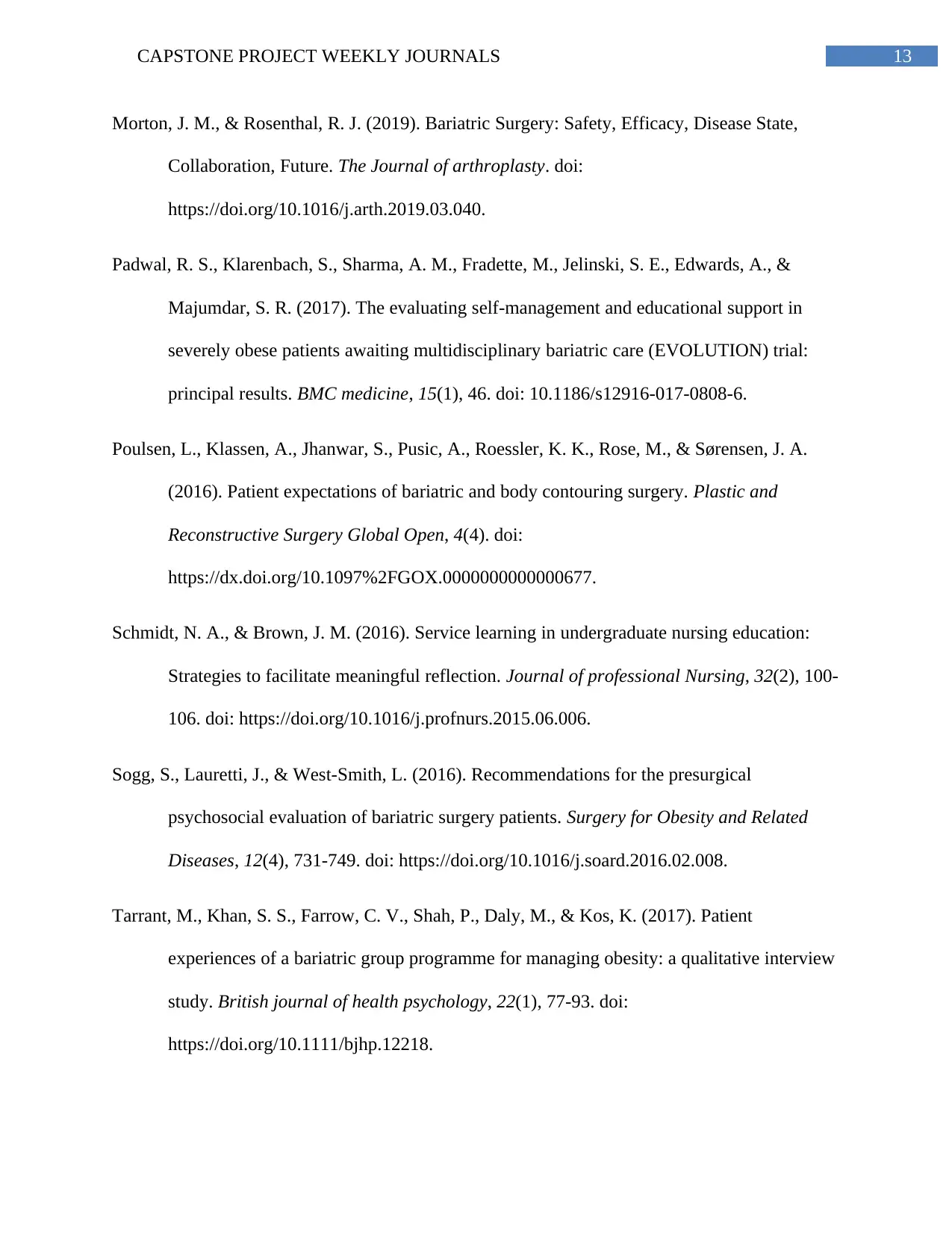
13CAPSTONE PROJECT WEEKLY JOURNALS
Morton, J. M., & Rosenthal, R. J. (2019). Bariatric Surgery: Safety, Efficacy, Disease State,
Collaboration, Future. The Journal of arthroplasty. doi:
https://doi.org/10.1016/j.arth.2019.03.040.
Padwal, R. S., Klarenbach, S., Sharma, A. M., Fradette, M., Jelinski, S. E., Edwards, A., &
Majumdar, S. R. (2017). The evaluating self-management and educational support in
severely obese patients awaiting multidisciplinary bariatric care (EVOLUTION) trial:
principal results. BMC medicine, 15(1), 46. doi: 10.1186/s12916-017-0808-6.
Poulsen, L., Klassen, A., Jhanwar, S., Pusic, A., Roessler, K. K., Rose, M., & Sørensen, J. A.
(2016). Patient expectations of bariatric and body contouring surgery. Plastic and
Reconstructive Surgery Global Open, 4(4). doi:
https://dx.doi.org/10.1097%2FGOX.0000000000000677.
Schmidt, N. A., & Brown, J. M. (2016). Service learning in undergraduate nursing education:
Strategies to facilitate meaningful reflection. Journal of professional Nursing, 32(2), 100-
106. doi: https://doi.org/10.1016/j.profnurs.2015.06.006.
Sogg, S., Lauretti, J., & West-Smith, L. (2016). Recommendations for the presurgical
psychosocial evaluation of bariatric surgery patients. Surgery for Obesity and Related
Diseases, 12(4), 731-749. doi: https://doi.org/10.1016/j.soard.2016.02.008.
Tarrant, M., Khan, S. S., Farrow, C. V., Shah, P., Daly, M., & Kos, K. (2017). Patient
experiences of a bariatric group programme for managing obesity: a qualitative interview
study. British journal of health psychology, 22(1), 77-93. doi:
https://doi.org/10.1111/bjhp.12218.
Morton, J. M., & Rosenthal, R. J. (2019). Bariatric Surgery: Safety, Efficacy, Disease State,
Collaboration, Future. The Journal of arthroplasty. doi:
https://doi.org/10.1016/j.arth.2019.03.040.
Padwal, R. S., Klarenbach, S., Sharma, A. M., Fradette, M., Jelinski, S. E., Edwards, A., &
Majumdar, S. R. (2017). The evaluating self-management and educational support in
severely obese patients awaiting multidisciplinary bariatric care (EVOLUTION) trial:
principal results. BMC medicine, 15(1), 46. doi: 10.1186/s12916-017-0808-6.
Poulsen, L., Klassen, A., Jhanwar, S., Pusic, A., Roessler, K. K., Rose, M., & Sørensen, J. A.
(2016). Patient expectations of bariatric and body contouring surgery. Plastic and
Reconstructive Surgery Global Open, 4(4). doi:
https://dx.doi.org/10.1097%2FGOX.0000000000000677.
Schmidt, N. A., & Brown, J. M. (2016). Service learning in undergraduate nursing education:
Strategies to facilitate meaningful reflection. Journal of professional Nursing, 32(2), 100-
106. doi: https://doi.org/10.1016/j.profnurs.2015.06.006.
Sogg, S., Lauretti, J., & West-Smith, L. (2016). Recommendations for the presurgical
psychosocial evaluation of bariatric surgery patients. Surgery for Obesity and Related
Diseases, 12(4), 731-749. doi: https://doi.org/10.1016/j.soard.2016.02.008.
Tarrant, M., Khan, S. S., Farrow, C. V., Shah, P., Daly, M., & Kos, K. (2017). Patient
experiences of a bariatric group programme for managing obesity: a qualitative interview
study. British journal of health psychology, 22(1), 77-93. doi:
https://doi.org/10.1111/bjhp.12218.
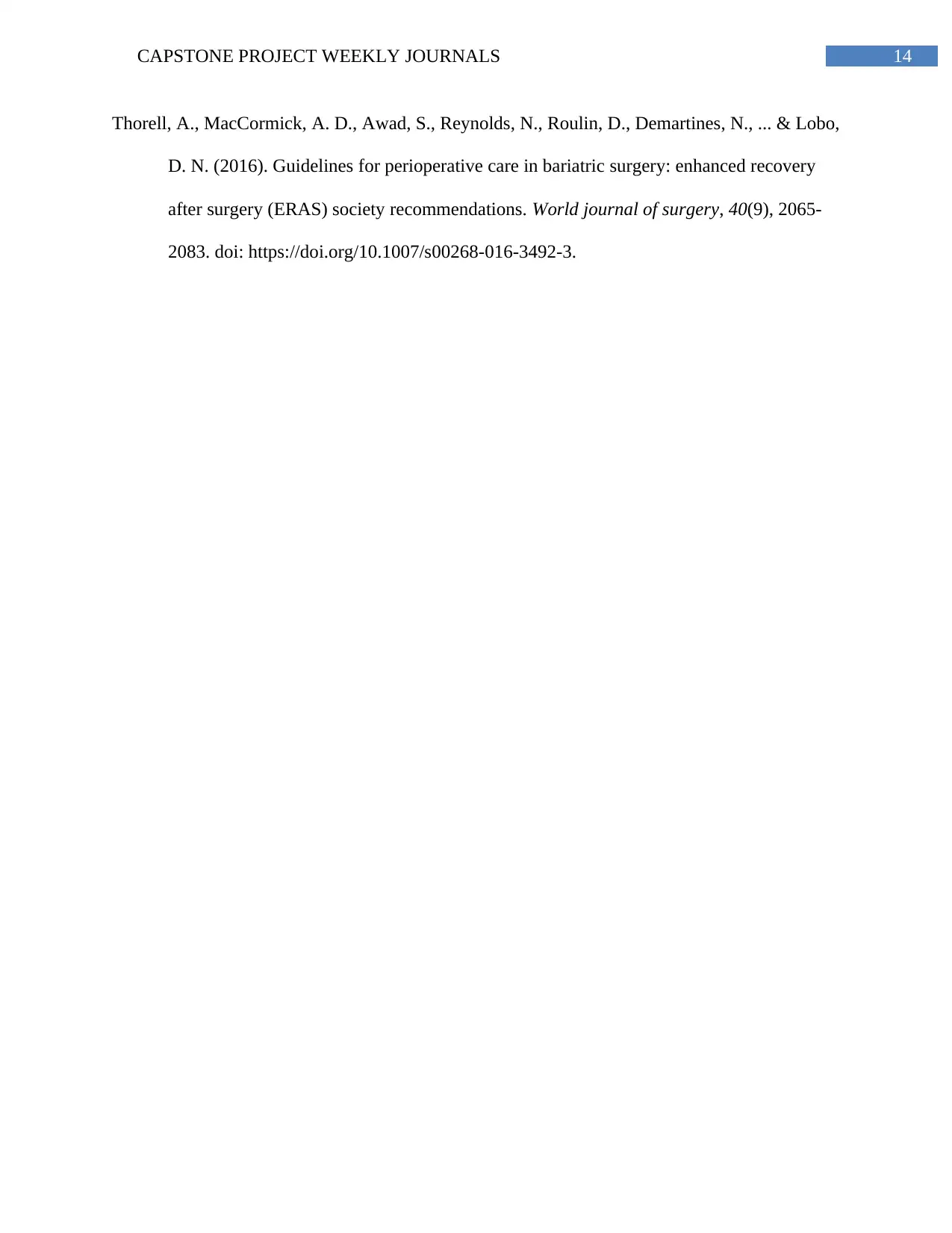
14CAPSTONE PROJECT WEEKLY JOURNALS
Thorell, A., MacCormick, A. D., Awad, S., Reynolds, N., Roulin, D., Demartines, N., ... & Lobo,
D. N. (2016). Guidelines for perioperative care in bariatric surgery: enhanced recovery
after surgery (ERAS) society recommendations. World journal of surgery, 40(9), 2065-
2083. doi: https://doi.org/10.1007/s00268-016-3492-3.
Thorell, A., MacCormick, A. D., Awad, S., Reynolds, N., Roulin, D., Demartines, N., ... & Lobo,
D. N. (2016). Guidelines for perioperative care in bariatric surgery: enhanced recovery
after surgery (ERAS) society recommendations. World journal of surgery, 40(9), 2065-
2083. doi: https://doi.org/10.1007/s00268-016-3492-3.
1 out of 15
Related Documents
Your All-in-One AI-Powered Toolkit for Academic Success.
+13062052269
info@desklib.com
Available 24*7 on WhatsApp / Email
![[object Object]](/_next/static/media/star-bottom.7253800d.svg)
Unlock your academic potential
© 2024 | Zucol Services PVT LTD | All rights reserved.





